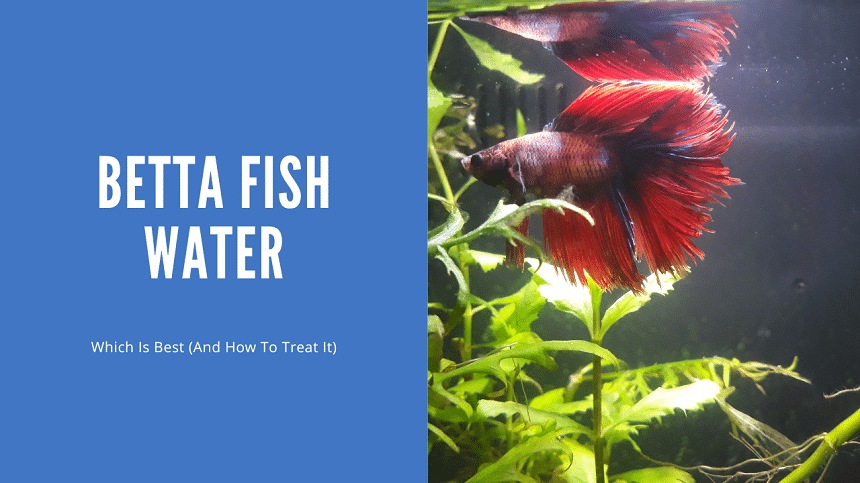Thank you for visiting! By the way… any links on this page that lead to products on Amazon and other stores/partners are affiliate links Aquarium Store Depot earns a commission if you make a purchase.
What is a fish tank without water?
Most people know that fish can’t live without water, but not many know why. Out of water, a fish is unable to breathe and slowly suffocates. However, fish can also die if kept in water that isn’t suitable for them long-term.
Bettas, also known as Siamese fighting fish, are easy fish to keep, but they need a good source of water for a long and healthy life. When it comes to aquarium water, not all sources are the same.
Here are some of the best sources of water for betta fish and how that tank water might need to be treated to keep your fish safe.
Key Takeaways
- Not all water is created equal and a good source of water will impact the success of your betta fish tank.
- Betta fish water conditions should be slightly acidic with a low general hardness.
- Tap water, bottled spring water, and well water are some of the most popular source water options for betta fish.
- The cleanest source waters are reverse osmosis water and reverse osmosis deionized water while the dirtiest come from nearby lakes and rivers.
Why It Matters
Like all fish, betta fish need water. Water provides the fish with dissolved oxygen and minerals that are essential for bodily processes. But betta fish can’t live in just any water.
Betta fish are hardy fish that can adapt to a large range of water conditions. Even these small, endearing fish have limits.
The best way to understand what kind of water betta fish need to thrive is by looking at their natural habitat. Betta fish live in stagnant, temporary pools throughout Southeast Asia. These floodplains and rice paddies are often filled with organics and other vegetation that lower pH levels and water hardness. The water temperature is nearly constant between 78-80° F1.
At the same time, betta fish have been bred in standard aquarium water parameters for decades. Most of these freshwater fish have never experienced those conditions seen in their natural habitat. Still, their bodies are unable to adapt to some of the more extreme parameters outside of their preferred range.
Many aquarium hobbyists find betta fish success in tap water, well water, distilled water, and bottled water.
Betta Fish Water Sources
There are many different types of water for betta fish. One of the most popular options is to use tap water, but the parameters of tap water vary greatly from one location to the next and may not be right for your aquarium. Luckily, there are other inexpensive options that can give the best betta fish water conditions.
1. Tap Sources
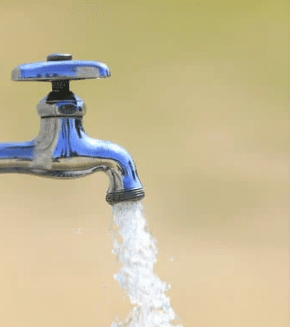
Most hobbyists have access to running tap water. Tap water is convenient and readily available while also being temperature-ready when needed. There are a few problems with tap water, though.
The parameters of tap water can vary greatly by location. Tap water is a public resource that is influenced by water facility treatments and storage. While water sits in a reservoir, it is influenced by its environment. This means that water parameters like hardness and pH can be changed by factors such as runoff and minerals. Phosphate and silicate may also be introduced, which are often related to algae problems in betta fish tanks.
Tap water is also heavily processed in order to be safe for consumption. This means that chemicals such as chlorine, chloramine, fluoride, and others are added daily.
Luckily, aquarium water conditioner products, like SeaChem Prime, remove chlorine and chloramine while detoxifying the ammonia that may come from that reaction. Not every water conditioner will treat tap water in the same way, though.
Seachem prime is a easy to use and affordable choice when it comes to remove chlorine and chloramines from your tap water. Highly recommended!
Most water conditioner options won’t treat pH or hardness, so those parameters will need to be manually adjusted. That being said, there are many water conditioner brands that offer a stress coat additive that can help protect and repair the fish’s mucus layer. Always make sure you use a condition when using tap water as untreated water can quickly kill your fish!
Another issue to consider with tap water is the quality of the pipes that the water is traveling through en route to your house. Unfortunately, many pipes contain rust and lead, which could unknowingly leach into the aquarium.
Pros
- Readily available and inexpensive
- Contains important minerals that betta fish need
- Water temperature can be easily adjusted for immediate use
Cons
- Contains harmful chemicals like chlorine and chloramine
- Influenced by natural factors that can make for unideal parameters for betta fish tanks
- Affected by water pipes
2. Bottled Water
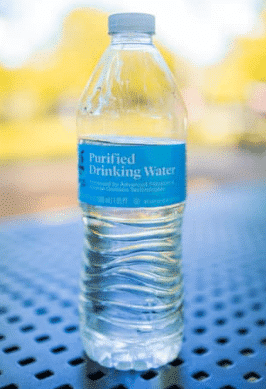
Bottled spring water is one of the oldest sources of water for betta fish. You might’ve been told to use bottled water when you won a goldfish from the fair, and that’s for a reason.
Bottled water is considered to be one of the most consistent sources of water as it’s been treated to be 100% pure. This water has been specifically filtered to remove harmful chemicals while being adjusted for mineral levels. Bottled water is dechlorinated, but can vary greatly in pH levels across different brands.
Some aquarium brands have taken the initiative to create specially prepared betta water that meets the parametric needs of bettas. This water is more expensive than usual, and some hobbyists may question how it differs from other popular bottled spring water brands meant for drinking.
It’s also important to note that while water may be labeled as being purified water, this may be a marketing tactic that makes the water more appealing despite still containing contaminants. Even if using bottled water, it is still necessary to regularly use an aquarium test kit to test water parameters for fluctuations.
Pros
- Consistent parameters that meet the water brand’s standards
- Pre-dechlorinated and filtered
- Easy to store for long-term use
- Betta-specific water brands
Cons
- Stored in plastic that could leach unknown toxins
- pH and mineral levels may vary between brands
- Contributes to single-use plastic waste
- Expensive
3. Well Water
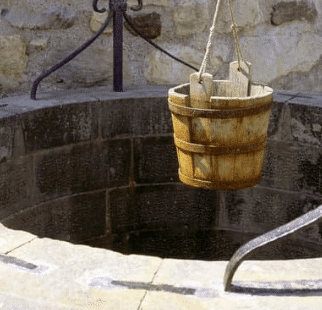
Well water is one of the most inexpensive options on this list for good source water for betta fish. This water originates from an underground aquifer, which means that it’s affected by environmental factors.
Again, well water parameters will depend on the minerals and nutrients of the aquifer that holds the water. Because of this, most well water has high hardness, which may need to be adjusted for before use in a betta tank. However, many beneficial natural minerals and nutrients also seep into the water, which can make for a healthy fish.
Well water is some of the purest water you can get for a betta fish tank as it is untreated and free from chemicals and other additives.
Pros
- Contains natural minerals and nutrients that are beneficial to plants and betta fish
- Relatively consistent water parameters
- Betta owners have control over additives and parameters at the source
- Readily available and free
Cons
- Needs to be tested and managed by individual hobbyists
- Parameters and overall water quality are not officially regulated
- Potential to temporarily dry up or run low during drought
4. Distilled Water

Distillation is the process by which water is boiled and the steam is then collected and cooled. Through this process, this new distilled water is demineralized and purified of most other contaminants.
For the most part, distilled water has only hydrogen and oxygen bonds. All other minerals and chemicals have likely been removed. While a good source of water, distilled water cannot be used by itself in the aquarium. This is because distilled water lacks important nutrients, like calcium and magnesium, that fish and plants need.
There are two ways to successfully use distilled water. The first way is to remineralize it, which can be done by adding aquarium-specific liquid or dry products. This is especially appealing for hobbyists keeping sensitive species that need very specific parameters.
The other way to use distilled water is by mixing it with another type of water that contains minerals, such as tap water or well water. This is especially effective if those sources introduce too many minerals at once, leaving the distilled water to dilute those amounts. This can also be a cost-effective solution for using distilled water as refills can become expensive over time.
While distilled water usually doesn’t need to be dechlorinated, it is always a good idea to preemptively dose for chlorine and chloramine.
Pros
- Base water (hydrogen and oxygen) without minerals or other additives
- Easy to dose with liquid and dry minerals for betta-specific water parameters
- Easy to find at grocery stores
Cons
- Lacks essential nutrients and minerals necessary for aquatic life
- Neutral pH which may need to be lowered for some bettas
- More expensive than other sources of water
5. Reverse Osmosis Water (RO)
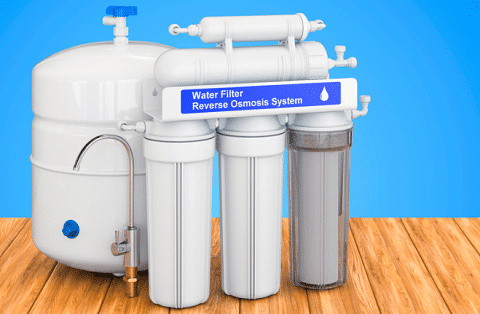
Reverse osmosis water, otherwise referred to as RO water, is most commonly used for saltwater aquariums but can be used in betta tanks as well. This type of water is purified by being pressured through a semipermeable membrane that helps remove minerals and other toxins.
While some fish stores may sell pre-processed RO water, most hobbyists install an RO system in their homes, which requires regular filter changes and replacements. Like distilled water, RO water provides a clean slate for hobbyists to add minerals and nutrients to their liking for bettas and other tank mates.
Pros
- All-in-one water purification system
- Purified water with little to no nutrients, minerals, or chemicals
- Easily remineralized for sensitive species
Cons
- Source water parameters need additional configuration
- Regular filter replacements and other maintenance
- Start-up costs are high
6. Reverse Osmosis Deionized Water (RO/DI)
Best Value
A complete 5 stage RODI unit without the excessive price
Reverse osmosis deionized (RO/DI) water is the purest water you can get for your aquarium. This water is similar to RO water but features an extra deionization stage that nearly eliminates all total dissolved solids (TDS). TDS are any dissolved solids, including most heavy metals, that are present in water. RO/DI water reduces TDS levels to nearly 0 ppm.
However, betta fish, plants, and invertebrates cannot live in 0 ppm TDS. These levels, along with pH, micro, and macronutrient levels, would need to be adjusted accordingly for a betta. To be the most cost-effective, it’s only recommended to use RO/DI if keeping other fish tank systems or very sensitive species. The trade-off is that RO/DI can be completely customized for the given tank setup.
Pros
- All-in-one RO/DI system
- The purest water with neutral pH, minimal nutrients and minerals, and low TDS
- Water parameters can be adjusted as needed with dosing and other supplements
Cons
- Additional products needed for water parameter configuration
- Regular maintenance is required for RO/DI system upkeep
- High start-up cost and continued maintenance expenses
7. Rain Water

Bettas are hardy fish that can adapt to a wide range of water parameters. So much so that they find themselves in rain-filled puddles that come and go with the wet and dry seasons.
If bettas can live in these far-from-perfect conditions then can they live in natural rain water?
It’s not usually recommended to keep any fish in harvested rain water. Rain water can have very different water parameters from your tank as well as from one collection to the next. Harvested rain water is often softer and more acidic than other sources of water, which is ideal for betta fish. However, the exact levels for these parameters may be too extreme or vary too much.
The bigger concern with using rain water for betta fish is pathogens. Wild betta fish have built up an immunity to naturally borne illnesses in their environment. Most betta fish available at your local pet store have been selectively bred for decades, which means they haven’t had to build up an immunity against those microorganisms and pathogens that might occur in rain water.
Other unknown factors that could be in rain water include acid rain, fertilizers, pesticides, and other harmful contaminants.
How to Make Betta Fish Water from Rain Water
If you’re confident in the quality of your rain water, then there are a few suggested methods to make it safe for betta fish use.
- Collect the water from a trusted source. If you live in a polluted area, then the rain water will also likely be polluted. Collect water far from areas of pollution and treat it immediately.
- Screen the water. Passing the water through a fine strainer will remove large contaminants, like insect larvae, rocks, decaying organics, and other macroscopic pieces that need to be removed.
- Purify the water. There are many ways to purify rain water for betta fish water use: boiling the water, running it through activated carbon, placing a UV sterilizer in the container, or using a RO or RO/DI system. It’s recommended to use at least two of these methods whenever harvesting your own rain water. For good measure, it’s also recommended to use a water conditioner even though chlorine and chloramine might not be present.
- Test parameters. Use a trustworthy water test kit to test levels of all the nutrients present, including ammonia, nitrite, nitrate, pH, phosphate, and water hardness.
- Adjust the water accordingly. As mentioned before, rain water is typically soft and acidic. You may need to add in additional dosings to raise levels to the desired ranges.
Pros
- Easy to collect
- Soft and acidic to match the preferred parameters of betta fish
- Often free of harmful substances found in tap water, like chlorine and chloramine
Cons
- Contains many unknowns in regard to pathogens and nutrients
- Rain water parameters can vary greatly
- Somewhat difficult to make safe for betta fish
- Limited by rainfall totals
8 Natural Sources

If you’re somewhere it doesn’t rain a lot but are surrounded by bodies of water otherwise, you might consider using a local lake or river for your betta fish water. Unfortunately, natural sources cause many of the same problems that rain water can.
In addition to harmful pathogens, bacteria, and viruses along with fluctuating parameters, natural lakes and rivers can also inadvertently introduce invasive species into your system. Unless you live in a perfectly protected area of wildlife preserve, chances are that there are invasive species at all levels of the food chain. The most common hitchhikers are insects and snails, especially if collecting live plants. However, much more harmful bacteria and viruses can also be introduced into the tank through natural sources.
While natural water might look safe to use, it can be filled with pollution, fertilizers, and pesticides just as much as rain water can. As mentioned before, the organisms living in these ecosystems have likely built a tolerance to these harmful substances, allowing them to live there indefinitely. Domesticated betta fish, on the other hand, would quickly succumb to untreated water from these locations.
In general, it is best to keep nature in nature and use tried and true sources of betta fish water.
Pros
- Using natural sources can make it feel like you’re making a natural aquarium biotope for your fish
- Free from added chlorine and chloramine
Cons
- May contain harmful pathogens and other invasive species
- Can be affected by pollution, fertilizers, and pesticides
- Fluctuating water parameters
FAQS
What kind of water do you use for betta fish?
Treated tap water is usually the best type of water to use for betta tanks. Tap water benefits include a relatively neutral pH, the presence of nutrients and minerals, and being readily available for use at any time. If doing frequent water changes, it is also very convenient to be able to adjust the water temperature without an aquarium heater before adding the water to the tank.
Keep in mind that tap water parameters will vary by location. The parameters mostly affected by geographic location are pH and general hardness. If these levels are too high, you may be left to look for another source of water to use.
Can betta fish survive in tap water?
Yes! Betta fish can live in tap water perfectly safe. In fact, tap water is the most preferred water to use for betta fish aquariums.
However, untreated tap water that hasn’t been dosed with a water conditioner can be deadly for betta fish. Tap water is regularly dosed with chlorine and chloramine which make water safe to drink. Unfortunately, these compounds are deadly to fish and invertebrates and need to be removed.
How do you prepare the water for a betta fish?
Depending on what kind of water for betta fish you choose to use, preparation will vary. If using tap water, bottled water, or well water, then you will likely only need to use water conditioners to remove chlorine and chloramine.
If you decide to go natural with rain water or local rivers and lakes, then a lot more preparation is needed. Treating these sources will take several steps of filtration and processing.
Though RO and RO/DI water shouldn’t contain harmful chemicals, it is still recommended to treat them as you would treat tap water with a water conditioner. These source waters will also need to be remineralized and adjusted for pH.
Do betta fish need anything in their water?
While you might think water is only hydrogen and oxygen, there is a lot more that is necessary for your betta fish’s success. Most importantly, minerals and nutrients, like calcium and magnesium, play important roles in the physiological processes of fish, plants, and invertebrates. Altogether, these minerals and nutrients play into the general hardness levels of the tank water.
Dissolved oxygen is also essential for aquatic life. Oxygen levels can deteriorate in stagnant conditions or when there is a lot of decay in the ecosystem.
What is the best bottled water for a fish tank?
The best bottled water for betta fish is bottled spring water with a relatively neutral pH and soft general hardness. This can be difficult to find as these parameters are not usually listed on the bottles. You may need to purchase several brands of water and test parameters for ones that meet your desired levels.
There are several aquarium products available for betta-specific water. One of these products is pre conditioned Fritz Betta Water. This water has been treated with a conditioner and has added tannins from Indian almond leaves for lowered pH and general hardness.
While good in a pinch, these premade waters can become expensive to use over time. In addition, they are easily replicated at home with some extra preparation.
Can I put spring water in my betta fish tank?
Yes! The best spring water to put in a betta fish tank has been filtered and bottled. However, if you have a natural freshwater spring by your house, you may be tempted to take it directly from the source, which is not recommended.
Though this water might look clear and refreshing, there is still a good chance that it contains pathogens and other harmful chemicals that can hurt your fish. If planning to take water from a natural spring, process it as much as you would for water from a lake or river.
Final Thoughts
A good fish tank starts with good water. Betta fish prefer slightly acidic and softer water than other tropical fish, so it’s important to pick a water that sets your fish up to thrive.
In general, the most popular betta fish water is tap water. Well water and bottled water are also good alternatives that provide a good basis for dosing other additives as needed. If you want the purest water possible, RO or RO/DI water will provide a clean slate for however you choose to make your own water!
- About the Author
- Latest Posts
I’m thrilled that you found Aquarium Store Depot! Here you’ll find information on fish, aquariums, and all things aquatics related. I’m a hobbyist (being doing this since I was 11) and here to help other hobbyists thrive with their aquariums! I adhere to a high quality Editorial Process and Review products with real life field usage and practical analysis.

